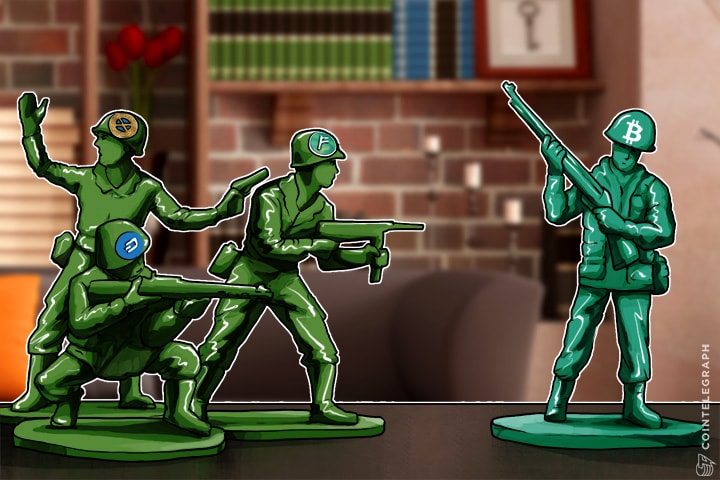Bitcoin has long held a firm lead in the cryptocurrency world. However, this advantage has become diminished over the years as more altcoins have made gains in distribution, value, and adoption. Bitcoin’s market capitalization percentage, well over 90% for 2013, has since declined to 82% after having reached an all-time low of 74% in March. Altcoins’ percentage of trading volume is also at an all-time high.
However, market capitalization and trading volume only tell half the story, ignoring adoption and acceptance by merchants. Cointelegraph spoke to several developers and representatives of alternative cryptocurrencies about the changing landscape of cryptocurrency adoption.
Bitcoin’s limitations
While Bitcoin has earned its place at the head of the cryptocurrency movement, it has reached certain limitations, according to Dash developer Moocowmoo.
“Bitcoin is amazing technology and has an extremely powerful network securing it, but because of it's social and financial inertia it cannot incorporate some of the technologies created since its inception. The resistance to adopting more modern techniques is a complex social issue, as recently illustrated by the block size debate.”
Moocowmoo noted Bitcoin’s mining issues due to hashrate changes, “recently, blocks 401410 and 402456 took 90 minutes to discover.” Hlynur Þór Björnsson, board member of the Auroracoin Foundation, notes Bitcoin’s place in the cryptocurrency world, but underscores the need for alternatives.
“I believe that we will always have Bitcoin as the backbone of the crypto market, something like USD works for the global economy and gold was before the USD. For crypto to become the standard, I'm sure we will need many altcoins and not just Bitcoin to cover and service small or large economies. Each economy will have to have the flexibility to devalue or appreciate if there are changes in the local economy.”
Dash
Recently, Dash has made inroads into merchant adoption, debuting a WooCommerce plugin, as well as a functioning vending machine to showcase InstantX instant zero-confirmation transactions. Currently, a reported 52 merchants worldwide accept payments in Dash.
As an example of other cryptocurrencies’ potential competitive advantage over Bitcoin, Moocowmoo mentions how Dash solved a declining node count issue.
“Last summer there were concerns about the declining Bitcoin node count. Dash's collateralized nodes create incentive to support network health by financially rewarding participants which provide well maintained, highly available nodes. While it is technically possible for Bitcoin to adopt a similar model, the Bitcoin mining community would likely reject splitting their block rewards to support it.”
Moocowmoo underscored the ability of alternative cryptocurrencies to rise above niche functionality to stand on their own.
“As users discover the limitations of the Bitcoin network that apply to their particular use cases, they will look for alternatives that address their needs. Over time, I'm sure the utility of these ecosystems will stand on their own merits.”
Auroracoin
Icelandic cryptocurrency Auroracoin, already in the hands of 10% of Iceland’s population, is making a comeback, debuting bus stop advertisements across the island nation while preparing an Auroracoin/króna exchange as well as integration with merchant point-of-sale systems.
Gudmundur Loeve, member of the Auraráð Foundation, rejects the idea of Bitcoin maintaining and strengthening its dominance.
“It’s contrary the very nature of the free flow of information and technology to assume that the monetary world will somehow stagnate into a centralized, standardized marketplace dominated by a single currency.”
Loeve believes currency competition will give increased rise to the prominence of altcoins.
“Quite the opposite, innovation and constant adaptation to dynamic socio-economic situations will result in the rise and fall of alternative digital currencies and tokens (altcoins) that are infinitely more adaptable to the fluidity of the real world than Bitcoin could ever or was ever meant to be.”
Scotcoin
A cryptocurrency relegated to Scotland, as of yet not a sovereign nation from the United Kingdom, is accepted at several retailers around the region, from virtual offices to pubs to clothing stores, and soon even airlines. In March, the Glasgow Rocks basketball team sold tickets for Scotcoin.
Willie Fleming, director of the Scotcoin Project, believes that alternative cryptocurrencies have the same position with the general public as Bitcoin, since “when we move outside the fintech/geek bubble and engage the average person in the street, while a few of them might have heard of Bitcoin, still nobody knows much about it.”
“So it's easier for us to introduce Scotcoin as a crypto-currency, entirely separate from Bitcoin, because, to the guy in the street, its all new. We use this to our advantage and hence Scotcoin is gaining traction because we are providing real use cases that are outside the crypto bubble. What increasingly matters to our users is what they can DO with the coin, not simply how many BTC they can get for it at that time on Bittrex.”
Fleming underlines the promotion strategy being employed with Scotcoin by strengthening adoption in every step of the economy.
“We do this by building "chains" eg. -- User buys beer in bar with Scotcoin, landlord uses that Scotcoin to buy kegs from the brewery, the brewer uses Scotcoin to buy barley from the farmer -- As the adoption of Scotcoin increases, we lengthen and branch these "chains" - This all requires great education and marketing effort, much of it face-to-face and somewhat different from what is generally perceived as how cryptocurrency entrepreneurs go about their business. The final result will be a currency that is accepted and traded alongside fiat both online and in bricks and mortar. The value of BTC will then matter as much to our users as the daily sterling/dollar rate matters users of UK pounds - ie: generally, not a lot.”
